Heeding the call Female referees take pride in managing the field of play, even amid continuing abuse from players, coaches and spectators
Read this article for free:
or
Already have an account? Log in here »
To continue reading, please subscribe:
Monthly Digital Subscription
$1 per week for 24 weeks*
- Enjoy unlimited reading on winnipegfreepress.com
- Read the E-Edition, our digital replica newspaper
- Access News Break, our award-winning app
- Play interactive puzzles
*Billed as $4.00 plus GST every four weeks. After 24 weeks, price increases to the regular rate of $19.00 plus GST every four weeks. Offer available to new and qualified returning subscribers only. Cancel any time.
Monthly Digital Subscription
$4.75/week*
- Enjoy unlimited reading on winnipegfreepress.com
- Read the E-Edition, our digital replica newspaper
- Access News Break, our award-winning app
- Play interactive puzzles
*Billed as $19 plus GST every four weeks. Cancel any time.
To continue reading, please subscribe:
Add Free Press access to your Brandon Sun subscription for only an additional
$1 for the first 4 weeks*
*Your next subscription payment will increase by $1.00 and you will be charged $16.99 plus GST for four weeks. After four weeks, your payment will increase to $23.99 plus GST every four weeks.
Read unlimited articles for free today:
or
Already have an account? Log in here »
Hey there, time traveller!
This article was published 11/10/2024 (366 days ago), so information in it may no longer be current.
It was early in Carriera Lamoureux’s refereeing career. She stood on the court — frozen and fearful.
A tense varsity girls high school playoff basketball game had come down to the final seconds and Lamoureux had made a crucial call, whistling a contact foul.
The call set up a free-throw situation and the resulting shots forced overtime. In extra time, the aggrieved team lost.
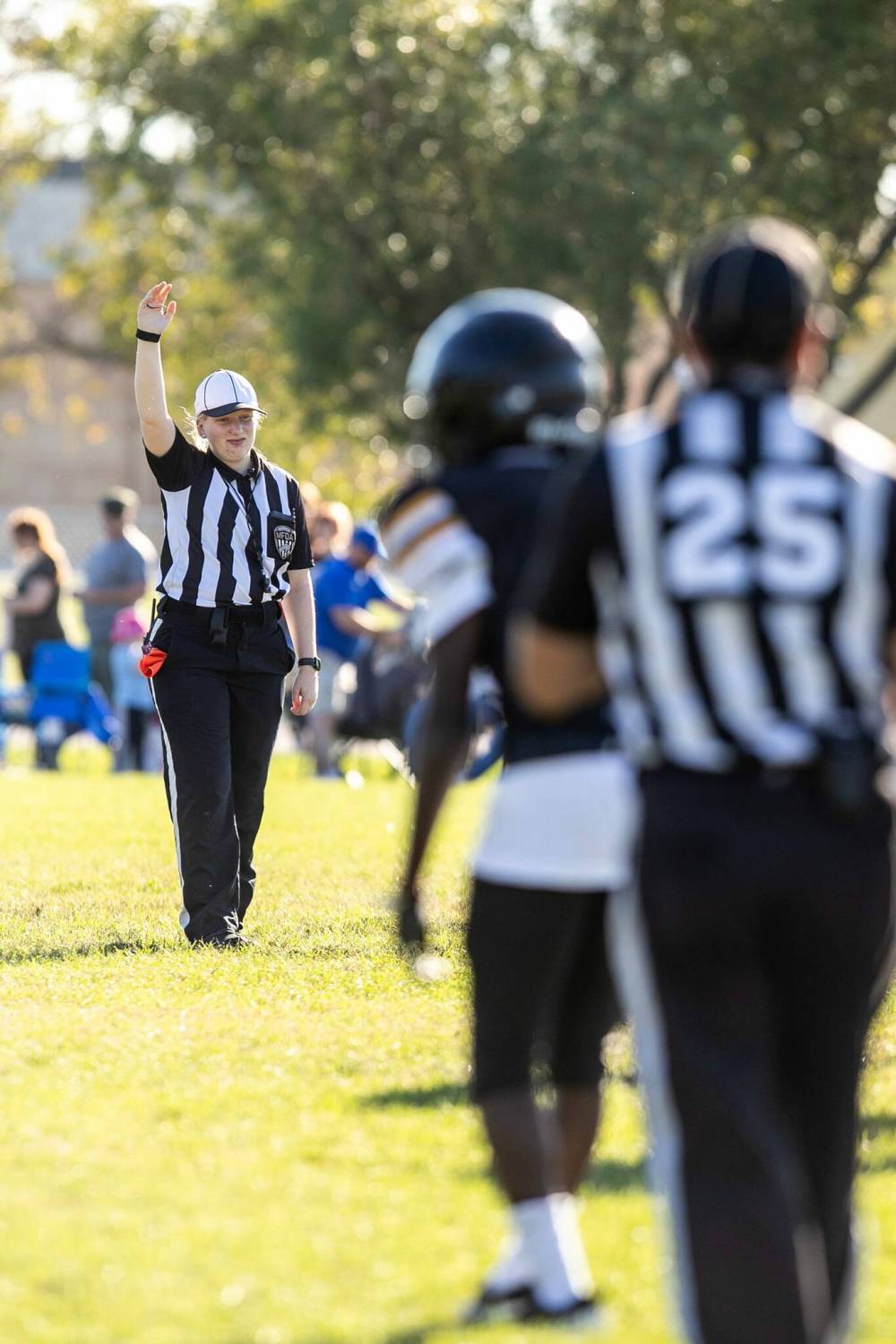
Parents stormed out of the stands to vent their anger. Coaches left the bench area to rush at the officials.
“I was scared… I’m thinking, ‘What on earth did I get myself into?’” Lamoureux remembers.
“I almost quit that day. I was so overwhelmed by just the sheer outbursts of anger. I was confused. I had to be escorted out of that gym by my partner.”
Lamoureux stood her ground and by the accuracy of her call that day — but the danger of the situation is not uncommon.
Male and female officials in many sports in Manitoba endure the indignities of verbal and sometimes physical abuse while plying their trade. But women surely have the tougher path, encountering slurs and challenges to their sanity and intelligence on an almost regular basis.
Lamoureux overcame that early trauma to referee again.
“I have never forgotten that moment and I never will, and it has helped me,” says the 31-year-old Winnipegger. “It gave me the biggest kick in the pants to become a little bit tougher, because by nature I’m a pretty easygoing person.
“It helped me find the value of being competent and strong, but also being kind and that’s the balance I look to navigate every time I step on the floor.”
How difficult is to be a female official in what used to be an exclusively male domain? The Free Press talked to six female officials in the sports of hockey, football and basketball to find out. Here are some of their stories.
Carriera Lamoureux, basketball
Lamoureaux, a graduate from the University of Winnipeg and a former U Sports player, was looking for a way to supplement her income in 2017.
Her partner and now-fiancé, basketball referee Wyatt Anders, suggested she try officiating.
“There was absolutely no way,” recalls Lamoureux. “I was a headache to referees (as a player)… I was annoying. I had things to say all the time and was hand-checking everybody. And there’s no way I’m going to cross that threshold and become the very thing that I disliked.”
However, she decided to give it a try. Working middle-school games to start, Lamoureux didn’t fall in love with the new gig immediately, struggling early, but the lure of higher-stakes games eventually took hold.
She rose quickly in the ranks, staffing her first U Sports men’s game in 2022 and was tabbed for the 17U women’s basketball nationals last summer. Lamoureux now works more than 100 games at various levels every season.
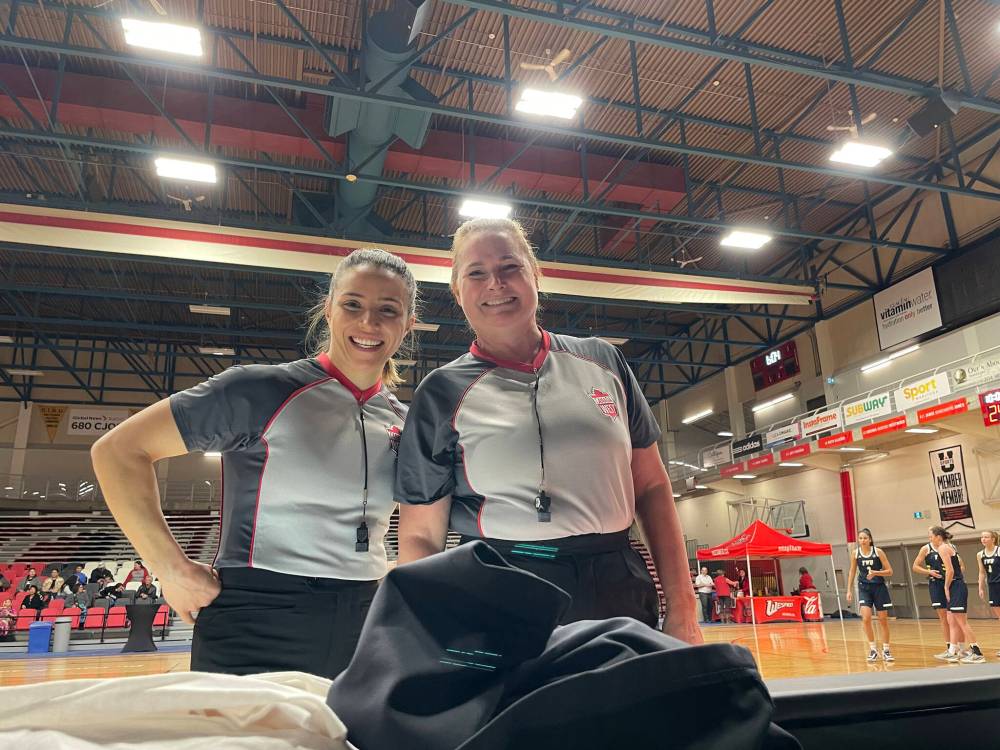
She still struggles with the criticism and the implication referees are an “enemy of the game.” Sometimes the attacks get personal, sometimes she’s accused of being a diversity hire.
“As a player, you make mistakes on the floor all the time,” says Lamoureux, who is Indigenous and works as the director of special projects for the Manitoba Aboriginal Sports and Recreation Council.
”I don’t stand up at the free-throw line as the trail official or at the three-point line and yell at a player who didn’t use their left hand on the left side. There’s a humanity in the game. And I try to bring my humanity to the game.
“Now, does it bite me in the butt? Sometimes, sure. There’s some times where there’s no working with people.
“But if I can demonstrate to you that I’m human, I’m going to make mistakes, but I’m going to try my best every single possession and I’m going to run the floor as hard as I can. Is there anything more that you can ask me?”
Lamoureux, who is five-foot-four, has become more adept at defusing tense situations. She works diligently to maintain her fitness and takes pride in her ability to keep up with the play. But disparaging outbursts from male players are still part of the landscape.
“It’s happens less at an adult level and more actually at a youth level,” she says. “When I enter a gym — let’s say I’m doing a senior men’s game — many of the players, they do know who I am, because they know that I’ve played and I do get a little bit more respect, although I had to earn it.
“Sometimes I’ve ended games, often at a youth level, for being called inappropriate things, the C-word being one of them. And a lot of it has to do with (the fact) they don’t see me at that level often enough.”
Lamoureux has a deep respect for veteran female officials in Manitoba — trailblazers such as Stacy Hawash and Martha Bradbury.
“They’ve kicked down the door for female officials in the sport of basketball,” she says.
“Not only have they kicked it down, they’ve held it open. And now it’s my job in my role to ensure that I also support the holding open of that door and now welcome younger female officials.”
Martha Bradbury, basketball
When Bradbury got her start in the winter of 1996, she was one of three female basketball officials in the province.
“Frankly, it wasn’t just boys’ teams that reacted like, ‘Holy moly, what’s happening?’” says Bradbury, 56.
“It was every team. My first year I went to single-A varsity girls’ provincials in Treherne. I literally walked into the gym and I heard someone say, ‘Wow, a chick ref.’”
Creaky stereotypes continue to this day.
‘No referee, no game’
More girls and women are playing important roles in increasing numbers as officials on the field of play.
This change is more consequential than just an uptick in participation.
“I do know that in the sports I see, I see more women refereeing,” says Dr. Sandra Kirby, a former Olympic rower who studies sexual abuse and harassment as a sociology professor at the University of Winnipeg.
More girls and women are playing important roles in increasing numbers as officials on the field of play.
This change is more consequential than just an uptick in participation.
“I do know that in the sports I see, I see more women refereeing,” says Dr. Sandra Kirby, a former Olympic rower who studies sexual abuse and harassment as a sociology professor at the University of Winnipeg.
“I see more women going to the Olympics as referees. I see more women running the clinics that train the referees. It’s not only a male that stands up there and gives you the technical (explanation).
“It’s often a woman and that’s important. So the more they do these things, the better the sport will be, because women, by and large, have a good influence on equity in the sport. And that radiates down to the players. The players are more likely to have a good experience and they’re more likely to thrive in the sport.”
Kirby says more individuals becoming officials should be a good thing and care should be taken in developing their skills.
“(Sport Manitoba) has a campaign that says ‘No referee, no game,’ which is quite true,” adds Kirby. “I think part of the answer is having more girls and women referee, obviously. I think one of the answers is having more supports for young referees. So when they’re 13, 14, 15, 16, they’re not there by themselves. There’s a senior referee who’s mentoring them and who helps them. And I’m aware if you have a senior referee and a younger referee, then you have a power dynamic, so you want to make sure it’s not an abusive relationship.”
Kirby, who does a lot of work on abuse in sport, touts education as the key to informing players about how to behave towards referees while also schooling those referees on how to manage the field of play.
Recently, Kirby made a presentation to basketball officials about their role in safe sport.
“I said, ‘Have you been bullied on the court? Yes. ‘By players?’ Yes. ‘Have you been bullied by the audience?’ Yes. ‘Have you retaliated?’ And a few hands would go up. Yes. And I said, ‘If you’re trying to be absolutely neutral, you can’t retaliate,’” says Kirby. “And they retaliate either by not calling something for a period of time, so an athlete eventually gets hurt, or by calling a lot against that athlete, so the athlete is eventually expelled.
“I said, ‘You need better rules to deal with that stuff. You shouldn’t have to engage in retaliation in order to control your field of play.’”
Kirby, who has served as an umpire in rowing, suggests a system of yellow and red cards (meaning caution and expulsion) could help to protect officials.
“You have to respect the relationships that exist there, but you also have to enforce the rules of the game while you’re doing it,” says Kirby. “So it’s very much being a good citizen. I’ve always said referees can’t pick their nose in public. You have to be on your very best behaviour when you’re out there and you’re in uniform because you represent the game.”
“I find it frustrating sometimes that it doesn’t matter how much you prove yourself and how capable you are, you almost have to be better than your male partner every time you go out,” she says.
“No matter what you do to prove yourself, you are always a ‘female’ official.”
Twenty-eight years later, the numbers have improved considerably. Approximately 20 (about 17 per cent) of the officials currently in her sport in the province are female.
Bradbury, whose husband Al was a longtime CFL referee and currently serves as the league’s supervisor of officials, has recently retired from working U Sports games and is devoting some of her time to assigning officials in the Manitoba High School Athletic Association’s South Central Athletic Conference (SCAC) and acting as a provincial supervisor.
Despite drawing more women to the officiating ranks, retaining officials, regardless of gender, remains an ongoing challenge.
“Frankly, it’s the abuse by the fans that makes it difficult for us to recruit and or retain officials,” she says. “What’s frustrating from an officiating perspective is that these fans don’t understand that without officials there’s no game.
“If you were in your everyday job, and every time you do something that they think is wrong, someone is saying, ‘What’s what’s wrong with you? Open your eyes.’ How are you going to perform? Are you going to increase your performance? Is it going to get better?”
Bradbury estimates the average age of officials in Manitoba is somewhere between 50 and 55. There needs to be an infusion of young blood, she says, because basketball is a fast game featuring extremely fit athletes.
While recruiting officials from the ranks of graduating university and college players seems logical, it rarely comes into practice.
“Every time I’m talking to high-level competitive university athletes (about refereeing), every single one of them says, ‘I can’t do that. I don’t want to get yelled at. I don’t want to be abused,’” Bradbury says.
“Even currently, the attitude is a little bit like the old-boys’ club — ‘you’re a woman and you need to be protected and I can’t put you in a situation like that.’
“It didn’t take very long until my assigner realized that I was actually able to: A. keep up with the play; B. manage the coaches; and C. manage the players. And it didn’t matter that I was female. That was probably my first year.”
Minor-basketball officials are not getting rich. Referees were paid $47.50 for high school games last season and the figure will rise to $50 per game in 2024-25.
“Frankly, it’s the abuse by the fans that makes it difficult to us for us to recruit and or retain officials.”– Martha Bradbury
“The reality is we’re getting compensated because we’re getting abuse,” says Bradbury. “If a parent was yelling all the things to a coach that they yell at an official, the coach would have the administration remove them and they wouldn’t be allowed to be in the gym.
“But because we’re officials, (it’s just) ‘Oh, it’s part of the game and you get paid to get abused.’ Well, do you? I don’t think it’s acceptable.”
Change is coming at a painfully slow pace. In the SCAC last season, two parents were banned from attending games after abusing officials. One parent stormed an officials’ locker room post-game while another waited to confront a referee in the parking lot.
“I don’t think the parents and, in a lot of cases, I don’t think the schools are doing a good job of teaching respect when they allow that kind of abuse to happen,” adds Bradbury.
“Which is why my conference — and we’re working on it provincially — has put in a strict discipline policy and parents know it and it’s shared with them.”
Ally Wareham, hockey
Wareham has one of the most physically demanding jobs in officialdom.
Primarily utilized as a linesperson, she has worked games up to and including last spring’s Manitoba Major Junior Hockey League final. With that progress, comes additional layers of pressure.
“We earn our spots to do those but if we do poorly, it’s a reflection of women in hockey,” says Wareham, a 29-year-old primary-school teacher from La Salle. “If a man does poorly, it’s a reflection of his performance.”
Dealing with frustrated, sometimes enraged players is a hazard of the job.
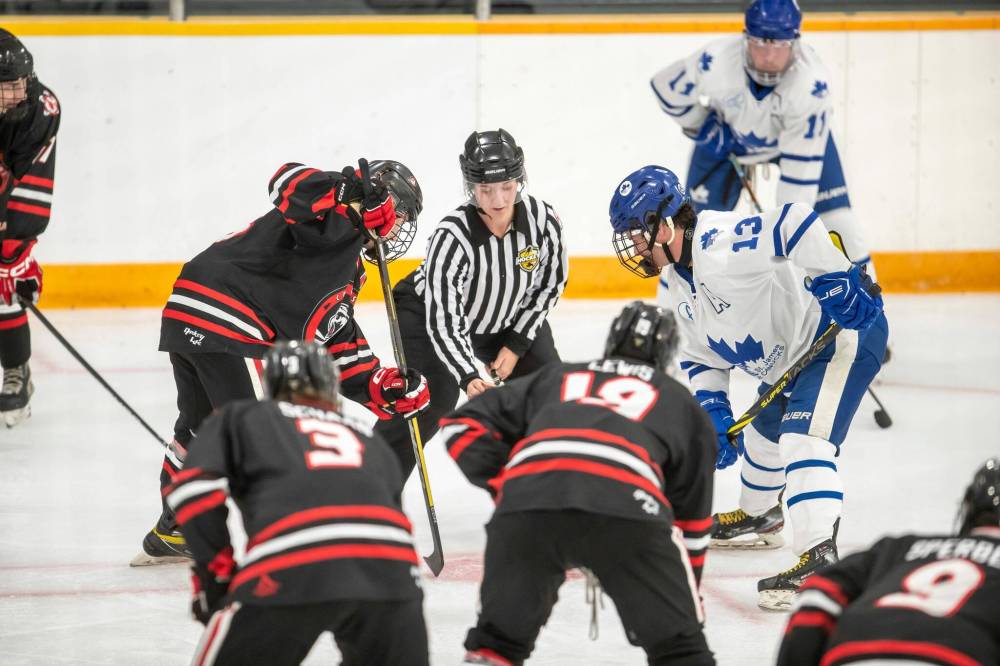
“I’ve had fights,” she says. “I’ve had a full-on line brawl. I’ve been involved in a goalie fight. I’ve been involved in scrums and altercations. I’ve been on the ice when my partner got taken out by a fight. I’ve been on the ice when people weren’t listening to me. So, yes to all of it, but not every game.”
After 15 years as a referee and linesperson, Wareham, one of nine female high-performance officials in Manitoba, relies on the camaraderie of her support group.
“My people are other female officials, where I will call one of them because I know they understand,” says Wareham.
“You’re gonna have unintentional injuries that are occurring and that’s one of the reasons it’s so important for any good linesperson, male or female, that you are talking while you’re going in (to a scrum) like, ‘Hey, it’s me, it’s ref, it’s ref. Don’t push, don’t push. We’re over.’ Because I don’t want to be socked in the face,” she says.
“I’m five-foot-eight, so I’m not a huge female, but I’m not a small female. But if you have some of the girls (officials) that are five-foot-two, they actually don’t have the physicality to move some of these men. And so that is a limiting factor in the hockey they can do in Manitoba.
“For myself, I’ve always been strong enough to line and do that, and you learn little tricks to kind of help you.”
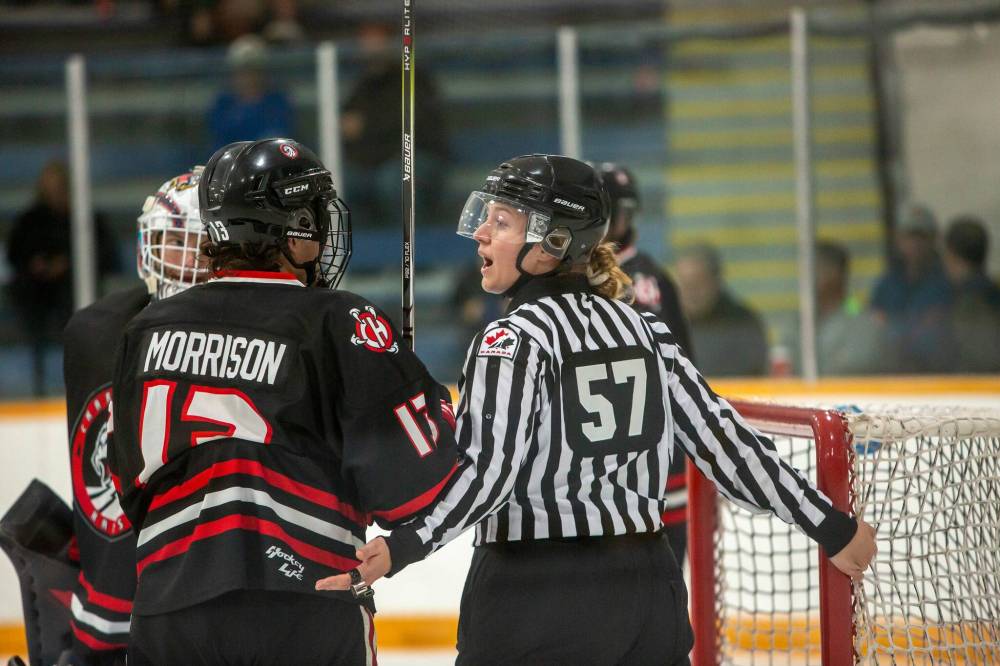
Cultural norms are slowly evolving into more modern thinking. Wareham remembers when she started as a 13-year-old that she was terrified to ask adult male referees to leave the changing area to give her privacy. Instead, she searched the arena for a women’s bathroom to change into her gear.
“There’s a lot less stigma to seeing a female on the ice because we see women at a high level doing those games now,” says Wareham, who also serves as referee-in-chief of the U15 AAA Manitoba Female Hockey League.
“It’s still an abnormality and I think some of the stigma that we still end up facing — the norms of the game and the norms of the culture — are still a current work in progress… I’m not afraid to say, ‘Hey, you need to stop talking about that.’
“Because I’m also established in leagues, I’m not afraid of that power dynamic. Whereas, when you’re 17, 18, 19, 20, and just coming up, you’re still worried about your spot in the leagues. Just like the players. It’s competitive for us.”
Experience has taught Wareham to use a nuanced approach to communicating with players and coaches.
“On the ice, I’m using my body language, my voice, my positioning to help communicate to players and coaches in the arena,” says Wareham.
“But for me to have my voice heard, I have to lower my voice and be quite loud, right? Where, if I do that at a certain tone, I’m being, excuse my language, ‘bitchy,’ right? Or I’m being controlling. Where there are a lot of times where, if men use that same tone or that same language, they get told that they are being authoritative.”
Lori Turski, football
Turski took an unconventional approach to the sport. She started playing football in 2015 and earned her official’s stripes a year later.
If you see her on the gridiron, you’ll know she’s in her element. She’s also a devoted student of the game.
“I have such a good knowledge of the game that I’m able to answer any of the questions that (coaches) have,” says Turski, a user-support analyst for Agriculture Canada.
“There’s even some male officials that I find, they don’t want to take the time to answer a question that would take 10 seconds to answer to calm the coach down.
“I’ll take the time, the extra 10 seconds, and say, ‘Hey, coach, this is the answer,’ or if I don’t know the answer, ‘I’ll get it for you, and I’ll get back to you.’ And that’s all they want. They want the respect, right? It’s a mutual thing.”
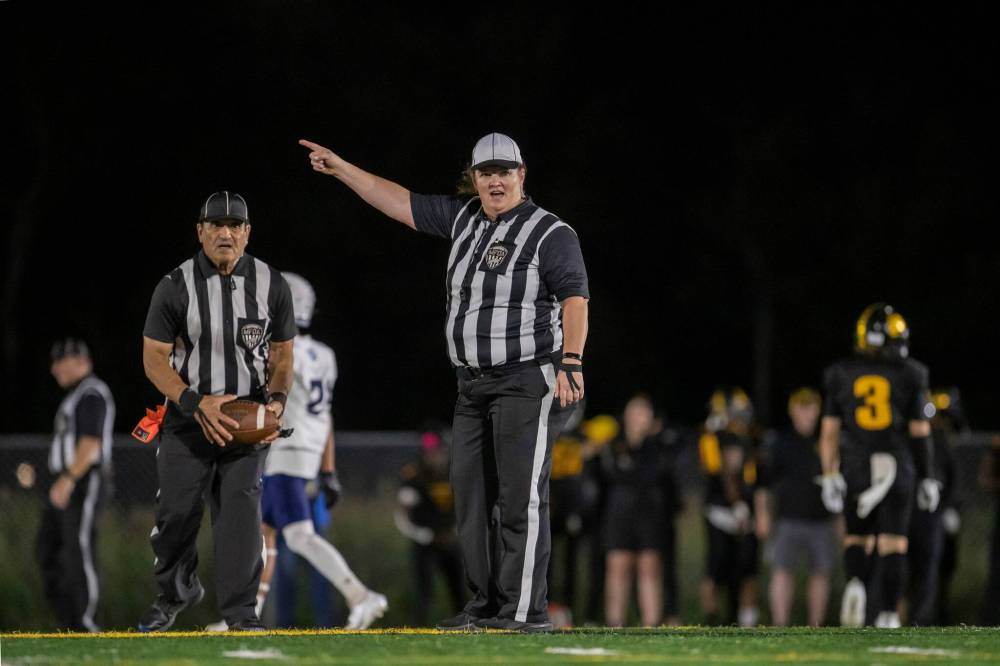
The women’s football season in Manitoba runs from May to June, which leaves time to serve as a head referee or umpire for high school and major junior football in the fall, collecting $70 per game. There are currently five female on-field officials and one timekeeper who are part of the Manitoba Football Officials Association, which governs high school level and above.
Turski, who says she rarely encounters disrespectful behaviour on the field, also works on the support crew — the officials moving the down markers along the sidelines — for Winnipeg Rifles, University of Manitoba Bisons and CFL games.
“I love being able to be part of the game and being able to support these kids being able to continue playing,” says Turski, whose youngest daughter will join mom and her two older sisters with the Manitoba Fearless of the Western Women’s Canadian Football League.
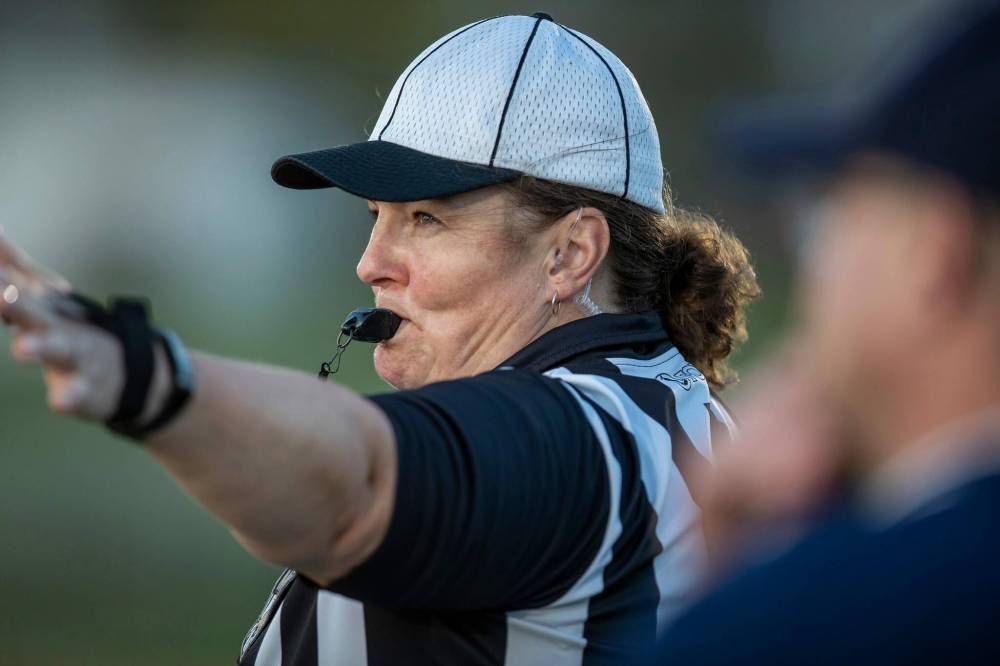
“Because without officials, you have no game, right? I love the game… I really enjoy the game and the camaraderie of it and then just the relationships you build within the game with fellow officials and fellow players and the coaches that you see year after year.”
The Lorette resident hopes to graduate to the Prairie Football Conference of the Canadian Junior Football League, U Sports and one day, perhaps, even the CFL. But at 49, she fears her chances at the big time are dwindling.
“I think in Manitoba we have a bit of an advantage with Al Bradbury (the CFL’s supervisor of officials) being here, right?” she says.
“Because he’s part of the CFL’s officials development. So I’ve actually been talking to him a fair amount this year about trying to move up. And he actually said to me, ‘I just moved a 51-year-old up into the CFL last year.’ So I’m like, ‘Oh there’s still hope for me.’”
Amy Martin, hockey
Hockey players, fans and coaches often get a bad rep. Sometimes that’s well earned.
“I would love to say that, ‘Yes, they are respectful’ but unfortunately it’s not the reality,” says Martin, Manitoba’s most accomplished female hockey official.
“I think, though, over the course of 15 or so years of being involved in it, that I do think the climate is improving. I think people are a lot more aware of it. But it hasn’t always been that way and it’s definitely not perfect.
“I think, specifically, hockey has a quite poor climate of how we address officials, compared to other sports.”
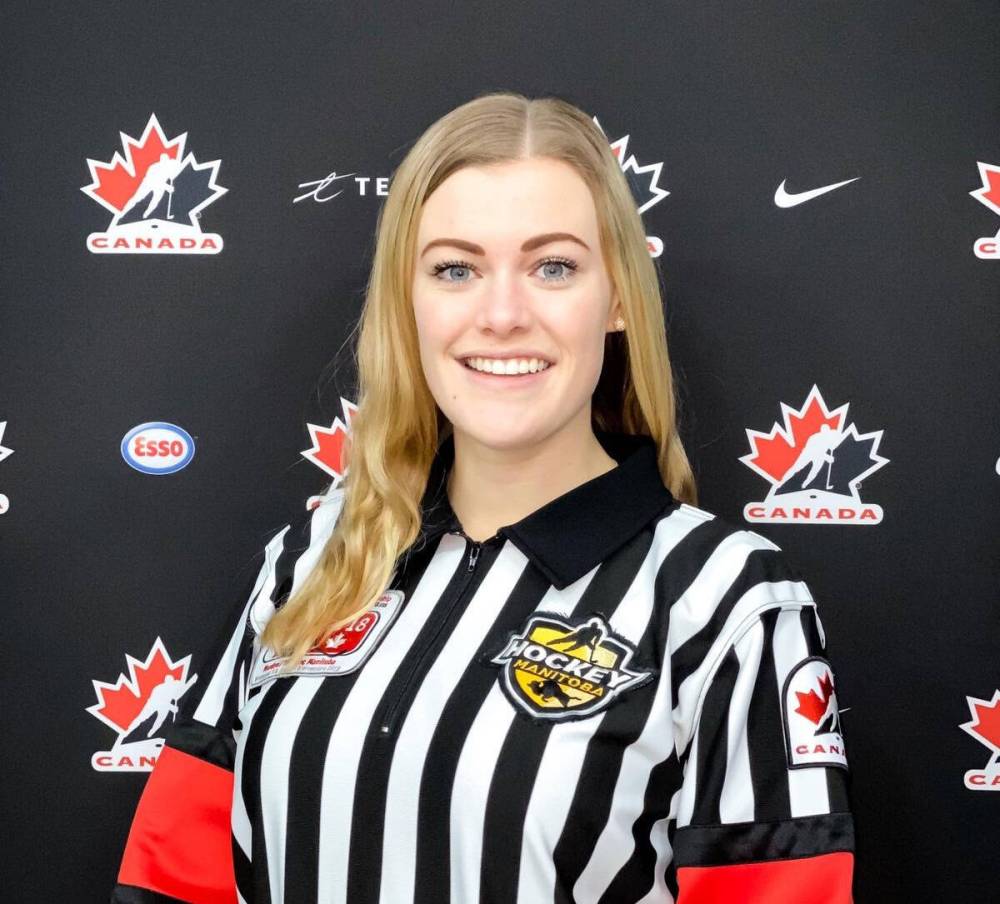
Martin started her career in stripes as a 13-year-old and 16 years later, her workload includes refereeing various national tournaments, as well as games in the MJHL (starting in 2021) and Manitoba Major Junior Hockey League.
Last winter, she called four games at the Women’s World Championship in Utica, N.Y., and four Professional Women’s Hockey League games, including her debut on Jan. 6 in St. Paul, Minn.
Martin has a sterling reputation now, but she endured some hard knocks earlier in her career.
“I referee now, but linespersons are generally responsible for physically breaking up fights,” says Martin, who is employed at MacDon Engineering in Winnipeg.
“So I was involved in intervening, and I separated one of the (16-year-old) players and we made eye contact. He was aware that it was the official that had separated him and he still chose to punch me twice. We removed him from the ice and he was assessed an abuse-of-official penalty.”
Did she consider quitting?
“It didn’t really deter me too much,” says Martin. “I guess the biggest thing for me from that experience was the fact that Hockey Manitoba dealt with it properly, and I felt like I was respected as an official. They supported me.
“So I think that’s probably the biggest factor. If your association is there to back you up and support you, I think that would kind of be a make-or-break deal.”
Martin is serious about her craft. She’s maintains her fitness as a competitive triathlete in the off-season and devotes vacation time away from work to refereeing at high-profile events.
“I guess the sense of community and the friends that you create through it,” she says, of what drives her. “My first few years growing up, I had a female friend and we would do it together. So that was really helpful, having at least somebody else you know in the same boat.
“And then I moved to Winnipeg, and then met a whole new group of officials. They’re honestly my closest friends. So the sense of community, I think, is a really big factor.”
Kennedy Molloy, football
Molloy has been officiating football since she was 12. In the early days, she accepted the verbal abuse on the field with silence and a steely resolve.
But now, having just graduated from the University of Winnipeg with degrees in business and conflict resolution, Molloy is putting her academic training into action.
“My default was just to avoid it and ignore it and kind of just pretend it wasn’t happening,” she says. “But then, having studied conflict, I’ve kind of learned that that’s not necessarily the best approach. Sometimes you do need to face that conflict head-on and address it.
“And so I think now when a coach starts yelling, or a player, I’ll give a moment to calm down, but I’ll approach them and say, ‘OK, you know, what is the problem? What’s bothering you? Let’s work together.’ And I found you get a better response out of that, or, oftentimes it’s a simple issue that you can then resolve.”
During the football season, she works three to five games per week at the high school level, earning $40 and up per game.
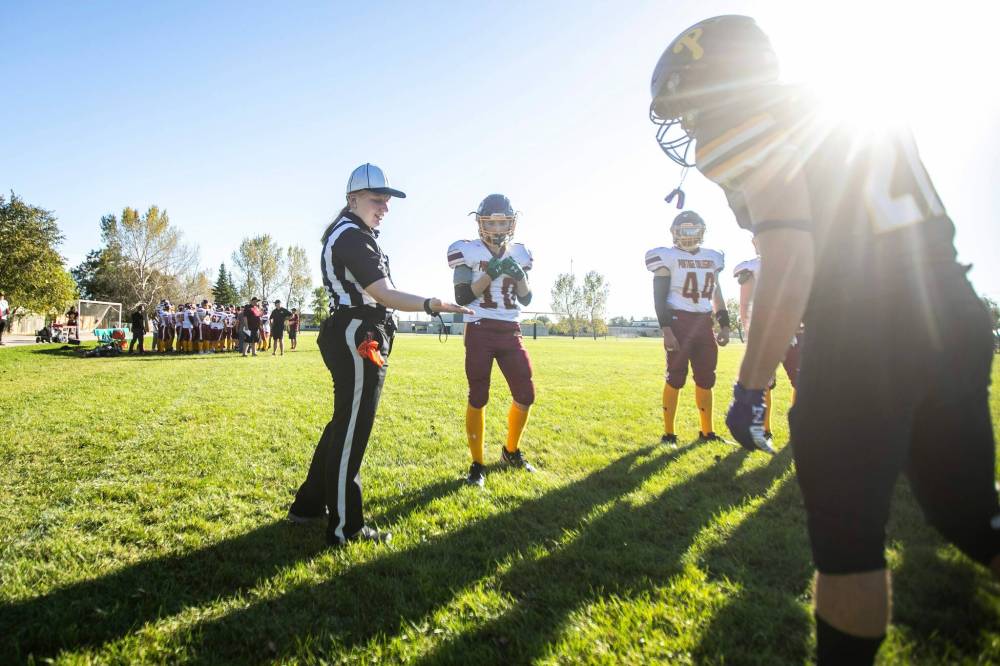
After playing linebacker and corner in co-ed football from the time she was eight years old until she was 11 in La Salle, her hometown, she guessed refereeing would be a great way to stay in the game. But it wasn’t always easy.
“There’s a different kind of level to it, especially being young and being a female,” says Molloy, 23. “You have these grown adults yelling at you. They’re bigger and older and so it can definitely be a little bit scary, but thankfully, you’re not alone out there.
“It’s a whole team of officials, and everyone does a really good job to take care of each other and look out for the younger people, especially.”
Molloy regularly studies the rule book to stay sharp and game-ready.
“It’s different going from a player to being a ref,” she says. “Not only do you have to know the rule, you have to know the application of the rule.
“I definitely wanted to make sure, because people can question you and it becomes intimidating. I wanted to make sure I was confident and a lot of that came from reading the rule book and familiarizing myself and asking questions.”
In 2022, she was chosen to travel to Ottawa to work with an all-female crew at the Football Canada Red-White game that concluded the senior women’s national team camp, teaming up with Emily Clarke and Georgina Paull, two female officials currently working in the CFL. Clarke and Paull are considered role models for up-and-comers such as Molloy.
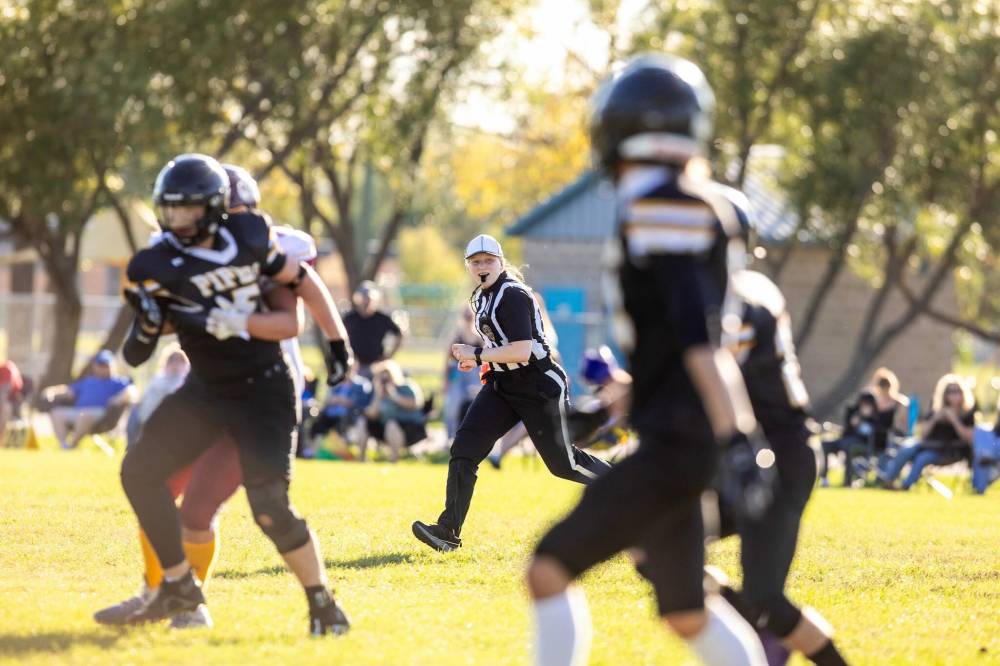
“I do aspire to do more,” says Molloy. “I eventually want to make it to the CFL and ref there. That would be my dream, right?
“But I know there’s kind of a path and you have to take it in steps. And so my next big goal would be to ref at the university level and I’m working towards that.”
Despite recognition on a national level, she often wonders if it’s all worth it.
“There’s definitely been some days where at the end of it, you come home and you think, ‘Why do I do this? I’m not getting paid very much and I’m practically just a punching bag for these grown men yelling at me,’” says Molloy.
“But often, what I tell myself is when I was a kid, I got to play football and part of being able to play was because there was people who were willing to come out and give up a day and officiate and make it possible.
“So I kind of remind myself of giving back to the community and back to the next generation.”
mike.sawatzky@freepress.mb.ca





